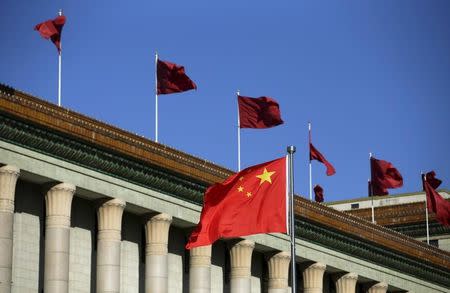China issues draft rules in crackdown on illegal fundraising

BEIJING (Reuters) - China issued draft rules targeting illegal fundraising on Thursday, as the authorities step up a campaign to crack down on risky and illicit behaviour in the country's financial sector. The draft rules, issued by the law office of China's State Council, call for participants engaged in illegal fundraising to cover the losses stemming from those activities. Regulators will guide financial institutions and non-bank payment service providers on tightening up their supervision of suspicious fund flows, the draft rules said. Local governments were called upon to maintain social stability while addressing the problem. Financial institutions and non-bank payment service providers, if found to be negligent, will be subject to having their illegal income forfeited. They will also be subject to a fine of more than 1 time but less than five times of the illegal income, the draft rules said. The executives responsible for the illegal activity will be removed and banned from entering the financial industry for a certain period of time and could be subject to fines of between 50,000 yuan and 500,000 yuan each ($7,507-$75,072), the rules said. Chinese authorities vowed in April to step up a crackdown on illegal funding scams, after reporting 5,197 new criminal cases last year involving 251.1 billion yuan ($36.5 billion), state media reported. More than 30 percent of illegal fundraising cases were related to private investment and financial intermediaries, including unlicensed investment advisers and providers of third-party wealth management products. Regulators embarked on a campaign against online finance fraud last year, focusing on peer-to-peer (P2P) lending platforms. But the rampant growth of the sector has created risks that will take time to resolve, analysts say. Ezubao, once China's biggest P2P lending platform, folded last year after it turned out to be a "Ponzi scheme" that solicited 50 billion yuan in less than two years from more than 900,000 retail investors through savvy marketing. Another case where illegal fundraising took place was at the Fanya Metals Exchange in southwestern Yunnan province, where hundreds of angry investors took to the streets and complained of government inaction after losing more than 40 billion yuan in investment products that had promised an annual return of up to 14 percent. Last year, China approved the arrest of 9,441 people on suspicion of illegally soliciting public deposits and prosecuted 14,745, state media said. ($1 = 6.6602 Chinese yuan) (Reporting by Stella Qiu and Matthew Miller; Additional reporting by Beijing Monitoring Desk; Editing by Jacqueline Wong)

